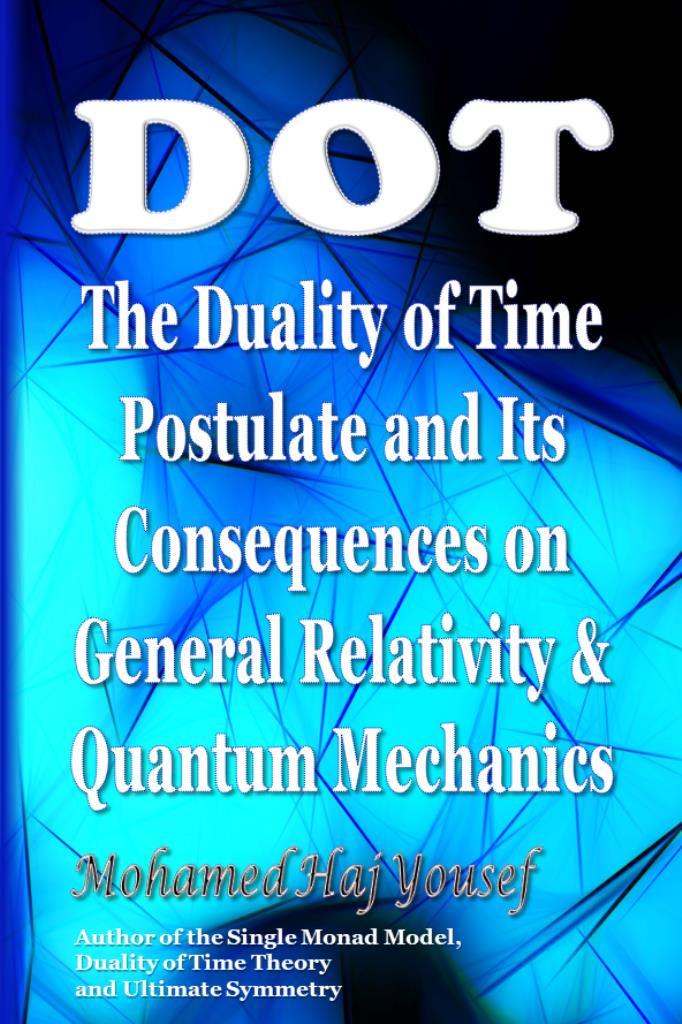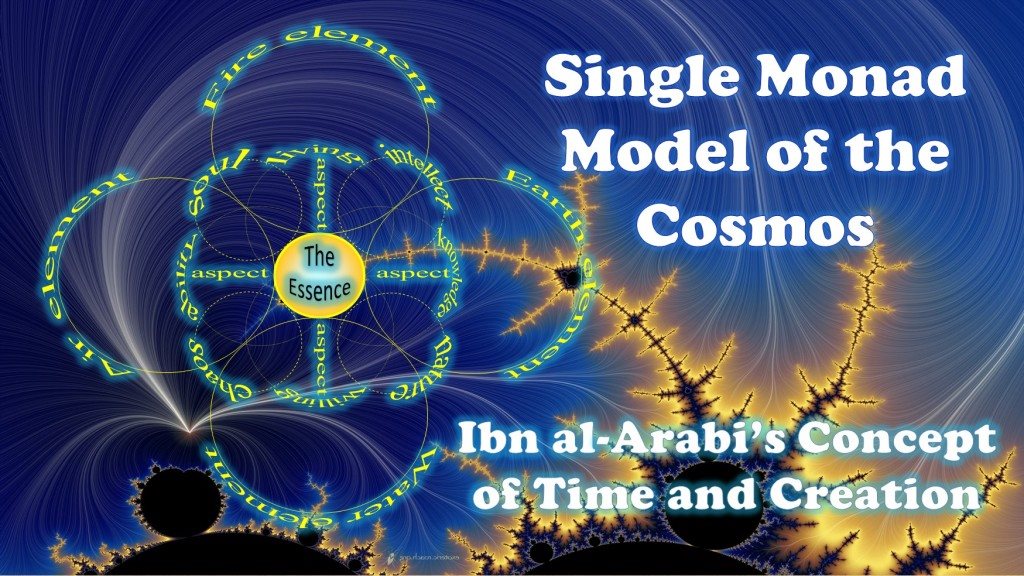
THE SINGLE MONAD MODEL OF THE COSMOS:
Ibn al-Arabi's Concept of Time and Creation
Search Inside this Book
ABBREVIATIONS
This book is mainly based on Ibn Arabi's major comprehensive work of Al-Futuhat Al-Makkiyya. Therefore, because we are going to refer to this book often, we shall use a short reference style directly in the text; after each quotation from the
Futuhat, we shall put medium brackets like that: [X.000.00] which means: [volume.page.line]. When the line number is omitted in rare cases this means that the reference is in the entire page, and in few cases a range of few pages is indicated like this example [II.229-231]. We have mainly used the standard edition of the
Futuhat published by many publishers based on (photocopy of) the old edition of Bulaq 1329/1911 which lies in four volumes each about 600-700 pages of 35 lines; the page size is 20 by 27 cm (see the Bibliography). You should notice, however, that newer type-scripted editions maybe different although some of them are also four volumes.
In addition to the
Futuhat, we also used short form of references to many other books by Ibn Arabi (like:
Ayyam al-Sha n and
Al-Masa il) and other related famous works (like William Chittick's two important works:
The Sufi Path of Knowledge [SPK] and
The Self-Disclosure of God [SDG]) as explained in the Bibliography. In most of these cases we put the short form of the reference followed by the page number, with only two exceptions for Osman Yahya's classification of Ibn Arabi's books and Ibn Arabi's book of
Al-Masa il where we refer to the listed item number instead of the page number.
All references to the Holy Qur an shall be indicated also in the text and not in notes; after each verse quoted or meaning indicated in the text we shall add parenthesis like that (xx:yy) where xx refers to the number of Sura (chapter) and yy is the number of Aya (verse). As for the prophetic narrations we mainly used
Kanz al- Ummal (the Treasure of the Workers) which includes most of the known
hadith books, indexed and numbered according to the subject. We only needed to mention the number of the hadith, in this way: [Kanz: 0000].
This table below shows the abbreviated references in the book:
| Abbreviation | Original Book |
| Kanz | Al-Muttaqi Al-Hindi (1989)
Kanz Al-'Ummal ('The Treasure of the Workers'), Beirut: Mu assasat Al-Risala |
| Futuhat | Ibn Arabi (n.d.)
Al-Futuhat Al-Makkiyya, Vols. 1-4, Beirut: n.p. (see the preface) |
| Fusus | Ibn Arabi (1946)
Fusus Al-Hikam, Cairo: n.p.; Critical Edition by Abu Ala Affifi |
| Diwan | Ibn Arabi (1996) Diwan Ibn 'Arabi, Beirut: Dar Al-Kutub Al- Ilmiyya, ed. Ahmad Hasan Basaj |
| Ayyam Al-Sha n | Treatise number 5 in: Ibn Arabi (n.d.)
Rasa il Ibn Arabi, Beirut: Dar Ihya Al-Turath Al- Arabi; reprint of Hyderabad ed. |
| Uqlat Al-Mustawfiz | Ibn Arabi (1919)
Uqlat Al-Mustawfiz, including
Kitab Insha Al-Dawa ir and
Kitab Al-Tadbirat Al-Ilahiyya fi Islah Al-Mamlaka Al-Insaniyya, Leiden: Brill; in
Kleinere Schriften des Ibn Al-'Arabi, ed. H. S. Nyberg |
| Insha Al-Dawa ir | Ibn Arabi,
Kitab Insha Al-Dawa ir; in
Kleinere Schriften des Ibn Al-'Arabi, ed. H. S. Nyberg |
| Al-Tadbirat Al-Ilahiyya | Ibn Arabi, Al-Tadbirat Al-Ilahiyya fi Islah Al-Mamlaka Al-Insaniyya; in
Kleinere Schriften des Ibn Al-'Arabi, ed. H. S. Nyberg |
| Al-Durrat Al-Bayda
| Ibn Arabi (2002-4)
Risalat Al-Durrat Al-Bayda
in:
Rasa il Ibn Arabi, Beirut: Mu assasat Al-Intishar Al- Arabi, ed. Sa id Abd Al-Fattah, vol. II: 131-45 |
| Al-Tanazzulat Al-Layliyya | Ibn Arabi (2000)
Al-Tanazzulat Al-Layliyya fi Al-Ahkam Al-Ilahiyya in:
Majmu at Rasa'il Ibn 'Arabi, Beirut: Dar Al-Mahajjat Al-Bayda, vol. II: 5-66 |
| Al-Tanazzulat Al-Mawsiliyya | Ibn Arabi (2000)
Al-Tanazzulat Al-Mawsiliyya fi Asrar Al-Taharat Wa-l-Salawat Wa-l-Ayyam Al-Asliyya in:
Majmu at Rasa'il Ibn 'Arabi, Beirut: Dar Al-Mahajjat Al-Bayda, vol. II: 67-314 |
| Kitab Al-Azal | This is books #11 in volume I of
Rasa il Ibn Arabi, Beirut: Dar Ihya Al-Turath Al- Arabi, n.d.), which is a photocopy reprint of the same famous collection published by the Da irat Al-Ma arif Al- Uthmaniyya (Hyderabad, 1948) |
| Al-Mu jam Al-Sufi | Al-Hakim, S. (1981) Al-Mu jam Al-Sufi: Al-Hikma fi Hudud Al-Kalima ('The Sufi Dictionary: The Wisdom in the Word') Beirut: Dandarah |
| SPK | Chittick, W. C. (1989)
The Sufi Path of Knowledge: Ibn Al- Arabi's Metaphysics of Imagination, Albany, NY: SUNY Press |
| SDG | Chittick, W. C. (1998)
The Self-disclosure of God: Principles of Ibn Al-Arabi's Cosmology, Albany, NY: SUNY Press |
| OY | Yahya, O. (1964), Histoire et classification de l uvre d Ibn Arabi, 2 vol., Damascus: Institut fran ais |
| EP | ed. by Paul Edwards (1967)
The Encyclopedia of Philosophy, 8 vols., New York: Macmillan Publishing |
| EI2 | Th. Bianquis, C. E. Bosworth, Vandonzel E. J., W. P. Heinrichs (edts.) (1987) Encyclopaedia of Islam, 9 vols., Leiden: Brill |
... Space Transcendence Read this short concise exploration of the Duality of Time Postulate: DoT: The Duality of Time Postulate and Its Consequences on General Relativity and Quantum Mechanics ...
... Imagination , Albany, NY: SUNY Press SDG Chittick, W. C. (1998) The Self-disclosure of God: Principles of Ibn Al-Arabi's Cosmology , Albany, NY: SUNY Press OY Yahya, O. (1964), Histoire et CLASSIFICATION DE l uvre d Ibn Arabi, 2 vol., Damascus: Institut fran ais EP ed. by Paul Edwards (19 ...
... each verse quoted or meaning indicated in the text we shall add parenthesis like that (xx:yy) where xx refers to the number of Sura (chapter) and yy is the number of Aya (verse). As for the PROPHETIC NARRATIONS we mainly used Kanz al- Ummal (the Treasure of the Workers) which includes most ...
... four volumes. In addition to the Futuhat , we also used short form of references to many other books by Ibn Arabi (like: Ayyam al-Sha n and Al-Masa il ) and other related famous works (like William Chittick's two important works: The Sufi Path of Knowledge [SPK] and The Self-Disclosure of ...
... mplex-Time Geometry and Perpertual Creation of Space The Ultimate Symmetry: Fractal Complex-Time and Quantum Gravity The Chest of Time: Particle-Wave Duality: from Time Confinement to Space Transcendence Read this short concise exploration of the Duality of Time Postulate: DoT: The Duality ...
... vols., Leiden: Brill Read Other Books: The Single Monad Model of the Cosmos: Ibn Arabi's View of Time and Creation The Duality of Time Theory: Complex-Time Geometry and Perpertual Creation of Space The Ultimate Symmetry: Fractal Complex-Time and Quantum Gravity The Che ...
... shall use a short reference style directly in the text; after each quotation from the Futuhat , we shall put medium brackets like that: [X.000.00] which means: [volume.page.line]. When the LINE NUMBER is omitted in rare cases this means that the reference is in the entire page, and in few ...
... on to the Futuhat , we also used short form of references to many other books by Ibn Arabi (like: Ayyam al-Sha n and Al-Masa il ) and other related famous works (like William Chittick's two IMPORTANT WORK s: The Sufi Path of Knowledge [SPK] and The Self-Disclosure of God [SDG]) as explained ...
... C. (1989) The Sufi Path of Knowledge: Ibn Al- Arabi's Metaphysics of Imagination , Albany, NY: SUNY Press SDG Chittick, W. C. (1998) The Self-disclosure of God: Principles of Ibn Al-Arabi's Cosmology , Albany, NY: SUNY Press OY Yahya, O. (1964), Histoire et classification de l uvre d Ibn A ...
... e of them are also four volumes. In addition to the Futuhat , we also used short form of references to many other books by Ibn Arabi (like: Ayyam al-Sha n and Al-Masa il ) and other related FAMOUS WORK s (like William Chittick's two important works: The Sufi Path of Knowledge [SPK] and The ...
... l-Layliyya fi Al-Ahkam Al-Ilahiyya in: Majmu at Rasa'il Ibn 'Arabi , Beirut: Dar Al-Mahajjat Al-Bayda, vol. II: 5-66 Al-Tanazzulat Al-Mawsiliyya Ibn Arabi (2000) Al-Tanazzulat Al-Mawsiliyya fi Asrar Al-Taharat Wa-l-Salawat Wa-l-Ayyam Al-Asliyya in: Majmu at Rasa'il Ibn 'Arabi , Beirut: Dar ...
... he Duality of Time Postulate and Its Consequences on General Relativity and Quantum Mechanics ...


















